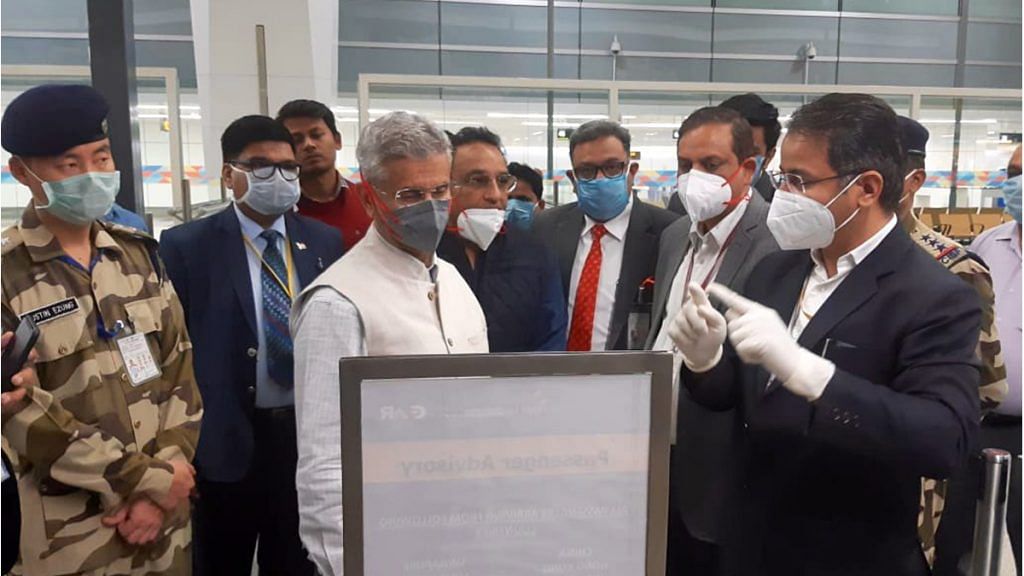New Delhi: In the last three days, several passengers complained of chaos at the Indira Gandhi International Airport due to the mandatory health screening being done to detect coronavirus cases, if any, among those coming to the country.
The move aims to prevent further spread of COVID-19 that has infected 150 people in India until now and claimed three lives.
Several passengers posted videos of CISF personnel, besides those from the Airport Health Organisation and the Delhi Police, refusing to return their passports without the screening. They also alleged that they were made to wait in queues for hours with other “suspected cases”, increasing their risk of contracting the infection.
Passengers at Delhi airport arrival hall waiting for corona virus screening.Just wondering what happens to these people if even one of them is positive among this crowd.Please use some common sense and find a better way of screening #coronavirusinindia pic.twitter.com/mTilIh8vtN
— Mehraj Lanker (@LankerMehraj) March 12, 2020
Passengers landing at any international airport in India, especially from the 11 marked out countries, are required to go through a mandatory screening. The 11 countries are UAE, Qatar, Oman, Kuwait, China, South Korea, Iran, Spain, France, Germany and Italy.
Speaking to ThePrint, a source in the Ministry of Home Affairs said the videos doing the rounds were from Sunday, when the airport had not streamlined the process of screening.
“The procedure has been laid down. The airport staff, immigration officers, CISF and Delhi police are working 24×7 to ensure that the process is smooth. But we need the people to cooperate with the teams at the airport,” the source said.
“No one is seizing passports of passengers. The team of Airport Health Organisation (APHO) is just taking passports of the passengers till their screening is done. If they get the clearance, their passports and luggage are handed over and they are free to go home with an undertaking that they will quarantine themselves,” he added.
If the passengers display any symptoms, they are directly taken to hospital.
“It is a global crisis and they need to understand that since the process for clearance is a bit lengthy, it takes time. One needs to be patient and calm. We cannot afford to not screen passengers properly,” he said.
Deleting my tweet right away as this clarification has been issued by Delhi Airport. My only concern was the safety of those who could have spread the virus to each other (and to others) due to the way they were herded together, and not that people should not be checked. ? https://t.co/YsSRfTnNa8
— Soni Razdan (@Soni_Razdan) March 18, 2020
Also read: Evidence emerging coronavirus could slow by summer with warmer temperature, humidity
The procedure in place
After the passengers de-board the flight, they are divided into five groups — each with at least 30 passengers.
Each group is then led by a team which includes two CISF officers, one personnel from the airline and an officer from the Delhi Police, who assist these passengers till the end to ensure smooth clearance.
Till Sunday, the APHO was taking the passports of passengers as soon as they de-boarded their flights. However, according to immigration officials, this was discontinued and the process was streamlined from Monday.
According to the new procedure, once the flight lands, the passengers go through an automatic screening.
“There is a system in place. Once the passengers pass through the automatic screening, there is a green light which flashes if the passenger is doubtful. We then ask them to step aside,” the immigration officer explained.
The passengers are then divided into three categories. Category A consists of people who are symptomatic. Category B are the people who are asymptomatic but are above 60 years of age and have other illnesses such as diabetes, kidney function issues etc. Category C includes people who do not have any symptoms, are less than 60 years of age and do not have a history of diseases.
“The people under the A category are taken straight to the hospital. The ones in B and C are taken for a thermal screening,” the officer said.
The government has also given directions that no flights from the 11 notified countries will land in India at the same time.
“No two flights are landing at the same time to ensure that the passenger flow is staggered and the screening can be done smoothly. The Air Traffic Control is ensuring this,” the officer said.
The passengers who are not doubtful are then taken to the immigration, following which they collect their baggage, clear customs and are then handed over their documents.
“After the screening is done, all the documents including passports are being handed over to the passengers. It is only the cases in which we are doubtful, multiple screening are also being done,” the officer said.
Also read: Govt sets up science and tech core team to coordinate efforts against coronavirus
